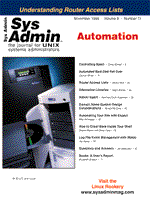
Listing 1: Sample script for physical disk copy
#!/sbin/sh # # # Physical disk copy script. This script copies # the original boot disk to another disk and then # checks the disk for file system consistency. # A log is also created to keep track of disk copy # activity. Modify this script for your configuration. # This script can be run from cron. # Set the “DD_DIR” variable to the # location of the “dd_script” shell script DD_DIR=”/var/sadm/dd_log” # Define the originating disk and the # destination disk. (be careful here!) PRI_DISK=”/dev/rdsk/c#t#d#s#” CPY_DISK=”/dev/rdsk/c#t#d#s#” # Set the block size to be used with the “dd”. # Block size formula: block size = (# of heads) x (# of cylinders) BLK_SZ=”126b” # Your block size may vary PATH=/usr/bin:/usr/sbin export PATH # Update the disk copy log (dd_log) echo “” >> “$DD_DIR”/dd_log echo “******************************************************” >> “$DD_DIR”/dd_log echo “`date` - Beginning boot disk copy using dd.” >> “$DD_DIR”/dd_log # Actual copy of disk is performed here. dd if=/dev/dsk/”$PRI_DISK” of=/dev/rdsk/”$CPY_DISK” bs=”$BLK_SZ” >> “$DD_DIR”/dd_log # This fsck makes sure the copied boot disk # comes up cleanly - all slices are fsck'ed # to make sure no partition is missed. Any slice # that is unused can be commented echo “`date` - Now performing fsck of disk” >> “$DD_DIR”/dd_log # Uncomment which disk partition that you want fsck'ed. Also, # indicate the proper controller (c#), target (t#), disk (d# - usually 0), # and slice (s#). #fsck -y /dev/rdsk/c#t#d#s# >> “$DD_DIR”/dd_log #fsck -y /dev/rdsk/c#t#d#s# >> “$DD_DIR”/dd_log #fsck -y /dev/rdsk/c#t#d#s# >> “$DD_DIR”/dd_log #fsck -y /dev/rdsk/c#t#d#s# >> “$DD_DIR”/dd_log #fsck -y /dev/rdsk/c#t#d#s# >> “$DD_DIR”/dd_log #fsck -y /dev/rdsk/c#t#d#s# >> “$DD_DIR”/dd_log #fsck -y /dev/rdsk/c#t#d#s# >> “$DD_DIR”/dd_log # Update the disk copy log echo “`date` - Boot disk copy has completed” >> “$DD_DIR”/dd_log echo “******************************************************” >> “$DD_DIR”/dd_log |